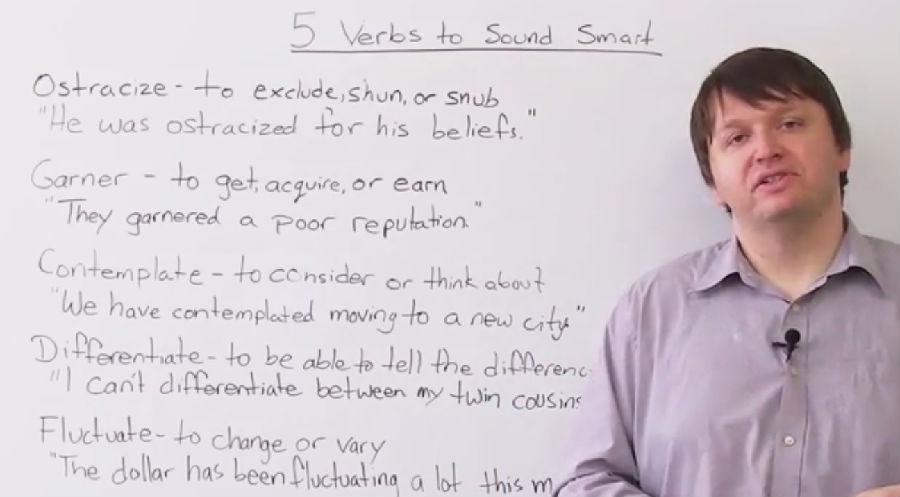(单词翻译:单击)
Hey, guys, I'm Alex, thanks for clicking, and welcome to this vocabulary lesson on: "5 Verbs to Sound Smart".
大家好,我是 Alex,感谢你点进来,欢迎收看这节“五个动词让你听起来更聪明”的词汇课。
Now, you may have already checked out my lesson on five nouns to sound smart, five adjectives to sound smart; and today, we're looking at the verbs.
你可能已经看过我关于“五个名词让你听起来更聪明”、“五个形容词让你听起来更聪明”的课程,今天我们要讲的是动词。
So, from the top, we have the verb: "ostracize", all right?So repeat it after me: "ostracize".
开头我们要讲的动词是 "ostracize" (排挤,孤立,放逐)。跟我读:"ostracize"。
Okay. So what "ostracize" means is to exclude someone, generally from a social group like a family, or a team, or any kind of religious group as well.
"ostracize" 的意思是将某人从一个社会团体中排除出去,比如家庭、团队或者还有各种类型的宗教团体。
So to exclude, shun, or snub them from a specific group.So, for example: "He was ostracized for his beliefs."
就是从某个团体中把他驱逐出去的意思,同义词有 "exclude" 、"shun" 或 "snub"。举个例子:“他因自己的信仰受到了排挤。”
So this person had different beliefs than the other people in his social group, and the other people in his social group basically pushed him away and didn't allow him to return.
所以这个人和他社会团体中的其他人有着不同的信仰,而他社会团体中的其他人将他推开了,不允许他回来。
They looked at...they looked down on him like he was less than them.He was ostracized; he was excluded from the group.
他们瞧不起他,就好像他低人一等一样。他受到了排挤,被排除在了这个团体之外。
So, again, you can be ostracized for your beliefs, you can be ostracized for something you say, you can be ostracized for something you do.
你会因为你的信仰受到排挤,会因为你所说的话受到排挤,会因为你所做的事情受到排挤。
So, for example, if you follow, you know, a system of faith, a religion that tells you that you have to act a certain way,
举个例子,假设你追随一种信仰体系,一种宗教,这个宗教要求你按某种方式行事,
if a person doesn't act that way, they could be ostracized by members of their religious community. Okay?
如果有人没有按那种方式行事,他就会被宗教团体的成员们排挤,懂了吗?
Next one: "garner".So think...look at my hands, "garner", which means to get, to acquire, to earn.
下一个:"garner"(得到,收集)。看我的手势,"garner" 的意思是得到,获得,挣得。
You can also think of it as to collect.So, the example we have on the board is: "They garnered a poor reputation."
还可以把它理解成“收集”。白板上写着的例句是:“他们得到了一个很坏的名声。”
So this group of people basically acquired a poor reputation for their beliefs or their actions.
这群人因为他们的信仰或者行为获得了一个很坏的名声。
You can also, for example, garner evidence.Like if you're a police officer, you can also garner information.
你还可以用这个词表示收集证据。如果你是位警察,你还可以收集信息。
So you can say: "We have been trying to garner, collect, or get, or acquire as much information as possible."
所以你可以说:“我们在努力尽可能多收集信息。”
Or: "The police haven't garnered enough evidence to, you know, send the suspect to jail."Next, we have: "contemplate".
或者:“警方还没有收集到足够的证据将嫌疑人送入监狱。”接下来我们来讲 "contemplate" (深思,打算,考虑)。
Now, some of you might be familiar with this word because it's similar to something, you know, in a Spanish language, for example.
你们中有人可能对这个词很熟悉,因为它和比如西班牙语中的某个词很相似。
And: "to contemplate" means to consider or to think about something.So, for example: "We have contemplated moving to a new city."
"contemplate" 的意思是考虑或思考某事。举个例子:“我们仔细考虑了要不要搬去一座新城市。”
So this could be a family or a boyfriend and girlfriend, or a couple and, you know,
这可能是一个家庭或者一对男女朋友,或者一对夫妇,
they have: "Hmm, okay, we have talked about it, we have thought about it, we have considered, contemplated moving to a new city."
他们是这样的:“嗯,好吧,我们已经谈论过了,我们思考过了,我们考虑过了,仔细考虑过了要不要搬去一座新城市。”
So if you're having a difficult time making a decision or it takes you a long time to think about the process of decision making, you can use the word: "contemplate". Okay?
所以如果做决定很艰难,或者你花了很长时间思考做决定的这个过程,那你就可以用 "contemplate" 这个词,懂了吗?
Next one is: "differentiate".So you might already see the word or hear the word: "difference". Right?
下一个:"differentiate" (区别,辨别)。你可能已经看过或听过 "difference" 这个词,对吧?
And this word, "differentiate" is the verb form of: "difference".So to be able to tell the difference, you can differentiate between two or more things, or people, or objects.
而 "differentiate" 这个词是 "difference" 的动词形式。为了能够找出差异,你可以把两个或多个事物,或人,或物品区分开来。
For example: "I can't differentiate between my twin cousins."
举个例子:“我区分不出我的双胞胎堂兄弟。”
An important thing to remember about differentiate is if you want to talk about and mention the two things you are comparing,
关于 "differentiate" 有一点很重要的内容要记住,如果你想谈论和提到你在比较的两个事物,
you can use the preposition: "between", so you differentiate between "A" or "B", or "A" and "B". Okay?
你可以使用介词 "between",所以区分两个事物时你可以说 "differentiate A between/ and B",知道了吗?
So to be able to tell the difference.My twin cousins look the same, I can't differentiate between the two of them.
为了让自己能够找出差异。我的双胞胎堂兄弟看上去长得一模一样,我无法区分他们两个人。
And finally, we have the verb: "fluctuate".This comes from the noun: "fluctuation".
最后我们要讲的是动词 "fluctuate" (波动,起伏,上下变动)。这是由名词 "fluctuation" 变化而来的。
So "to fluctuate" is to change or vary, usually at regular intervals.So the sentence we have on the board relates to the stock market.
"fluctuate" 的意思是定期改变。白板上列出的例句和股市有关。
For example: "The dollar has been fluctuating"-has been going up, going down, changing, hasn't been stable-"a lot this month."
看一下这个例句:“这个月美元波动很大”,说明美元在上涨、下降,在不断变化,不稳定。
So if something is constantly changing; going up, going down, going left, going right, it is fluctuating.
所以如果某事物在不断地变化,不是上升就是下降,不是往左就是往右,那就可以说它在波动。
So what are some things that can fluctuate?We can talk about the economy, you can also talk about the weather.
会波动的事物有哪些呢?我们可以用它来谈论经济,还可以用来谈论天气。
So you can say: "The weather has been fluctuating a lot this week."
所以你可以说:“这个星期的天气变化无常。”

You can also talk about, you know, your beliefs or the things you say if they're inconsistent with one another.
你还可以用它来谈论你的信仰或者你说的话,如果它们互相矛盾的话。
Okay, guys, so from the top, let's just listen and repeat for the pronunciation of these words.
好了,朋友们,我们从头开始听一遍并跟读一下这些单词的读音吧。
"Ostracize", "garner", "contemplate", "differentiate", and "fluctuate".
"ostracize","garner","contemplate","differentiate" 和 "fluctuate"。
Okay, guys, so again, if you want to test your understanding of how to use these words in a sentence,
好了,朋友们,再说一遍,如果你想测试一下自己有没有理解如何将这些词用在句子里,
how to spell them correctly, and just, well, how to use them correctly...I mean even if you know what the word is, it's a different story to be able to use it and incorporate it into your everyday vocabulary.
如何正确地拼写,还有如何正确地使用......我的意思是,即使你知道这个单词是什么,会用它并且能把它融入到你的日常词汇中就又是另一回事了。
All right, guys, as always, check out the quiz on www. engvid. com and don't forget to subscribe to my YouTube channel.I'll see you guys later, take care.
好了,朋友们,和往常一样,请登陆 www. engvid. com 查看小测验,还有不要忘了订阅我的 YouTube 频道。下次见,保重。


